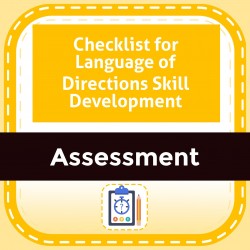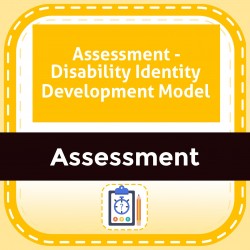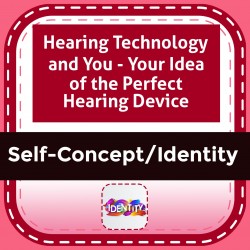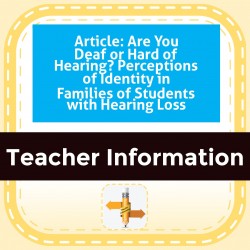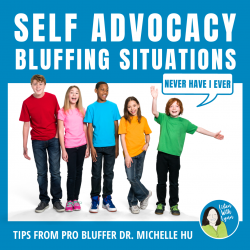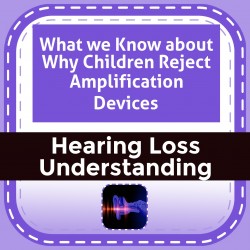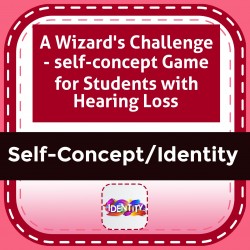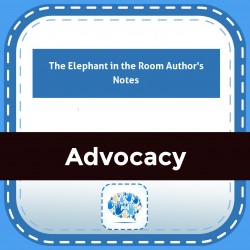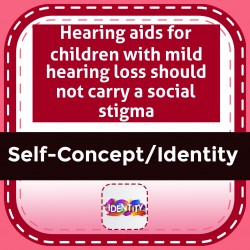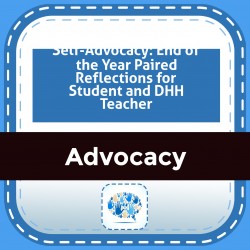Ability Levels
Categories
Resource Types
Age/Grade Range
CCSS
Anchor Standard
Speaking & Listening
Language
Reading
Checklist for Language of Directions Skill Development
$ 195
This functional checklist includes 10 examples of each of different type of question categories: one-part directions, yes/no questions, what, where, who, why, when questions. Age level expectations ar
...
e provided for each type of question category. Provides 3 columns to show test dates and check off for mastery so the checklist can be used by educators or families for progress monitoring.
Assessment - Disability Identity Development Model
$ 295
Gibson's Identity Model is explained in three stages. Students are asked to rate each of the statements about their hearing loss, feelings about fitting in, and how they self-identify. Fillable form.
Hearing Technology and You - Your Idea of the Perfect Hearing Device
$ 175
Worksheet poses questions for individual or grouPS- of hard of hearing students to discuss regarding their idea of a perfect hearing device and how hearing loss is a part of who they are.
Article: Are You Deaf or Hard of Hearing? Perceptions of Identity in Families of Students with Hearing Loss
$ 0
Article reporting results of a study analyzing the self-identities of students with hearing loss and the perceptions of family members. Findings support identity as a fluid concept.
Self-Advocacy Bluffing Situations - Never Have I Ever Activity
$ 7
18 Mini-Lessons target BLUFFING and foster self-advocacy and personal responsibility for kids that are deaf and hard of hearing. This resource is based on the NEVER HAVE I EVER game which is fun and m
...
and motivating for elementary and middle school-aged kids.Bluffing is pretending to hear or acting in a way that shows you understand what is being said when you are not following the conversation. Bluffing, faking, and pretending are common habits of most people with hearing loss.INCLUDED:Tips from Pro-Bluffer, Dr. Michelle Hu, a pediatric audiologist and bilateral cochlear implant recipient. Michelle knows what it is like to bluff and shares words of wisdom based on her life experiences. Follow Michelle on Instagram as she shares her hearing loss journey.18 Never Have I Ever Mini-Lessons✧ Real photos that illustrate the social situations and scenarios✧ Each situation pictures a student who says: (example) "Never Have I Ever pretended that I didn’t want to join in the game.”✧ The kids' self-talk or comments. (example) "It’s easier to not play rather than mishear and mess up."✧ Talking points with guided questions/discussion prompts.Children grapple with BLUFFING in challenging situations. Discussing possible plans of action, and exploring positive coping and communication repair strategies within a supported environment is important. Self-advocacy success requires knowledge, skills, and importantly ample practice opportunities.➼ DIGITAL - NO PRINT can be opened and played with your favorite PDF reader app on a tablet. When playing on a computer, open and use a PDF reader such as Adobe Acrobat Reader DC which is free. ➼ PRINT - Print out the 18 situations and a copy of the Discussion prompts and questions.◈ ◈ ◈ ◈ ◈ ◈ ◈ ◈ ◈ ◈ ◈ ◈ ◈ ◈ ◈ ◈ ◈ ◈ ◈ ◈ ◈ ◈ ◈ ◈ ◈ ◈ ◈ ◈ ◈ ◈ CUSTOMER TIPS➼ Questions? EMAIL ME before purchasing this resource or anytime later.♥ Sign-up HERE for the Listen With Lynn Emails♥ Let’s ConnectInstagramFacebookKeep up your good work. I am blessed to help along the way.Thanks so much!Lynn Wood
What we Know about Why Children Reject Amplification Devices
$ 1
This information reviews research findings that provide insight on which students are more likely to refuse to wear their hearing amplification and reasons why.
A Wizard's Challenge - Self-Concept Game for Students with Hearing Loss
$ 0
The Wizard's Challenge Game is a relevant and motivating resource which can be effectively used with students to reinforce standards based IEP goals and/or objectives in the areas of self-advocacy, se
...
lf-concept, communication repair and amplification utilization. The game relies on the players having some knowledge of the Harry Potter books or movies as it compares children with hearing loss living in families where they are the only ones who are deaf or hard of hearing to families of muggles that have a child who is a wizard or witch born into them. A parallel is drawn of Harry as 'The Boy Who Lived' being the only one with a lightening bolt scar on his face at Hogwarts to the student who is the only one using hearing devices in his or her neighborhood school. Print your own game board, cards, and game pieces.
The Elephant in the Room Author's Notes
$ 0
The
author explains how hearing loss
technology can improve but not restore hearing, miscommunication can happen,
and communication repair strategies.
...
Hearing aids for children with mild hearing loss should not carry a social stigma
$ 0
Brief informational article. Even mild hearing loss can have an impact on a child's ability to learn, but many parents balk at the idea of hearing aids.
Self-Advocacy: End of the Year Paired Reflections for Student and DHH Teacher
$ 2
This no-prep activity is ideal to use at the end of the school year with your deaf or hard-of-hearing students. Use this resource as an opportunity to reflect on the school year, your student's growth
...
and needs, and your own growth and needs as a teacher as well. Having an open dialogue with your student using these guiding questions will help you to understand how you can further support them as a Teacher of the Deaf and Hard-of-Hearing.This resource contains a reflection pages students to complete, a reflection page for teachers to complete, and a supports page for both to complete together.
 Your browser is out of date. For best experience switch to latest updated Browser.
Your browser is out of date. For best experience switch to latest updated Browser.
 Get Chrome
Get Chrome Get Edge
Get Edge Get Firefox
Get Firefox